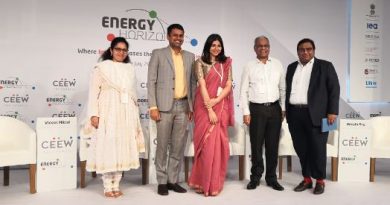Vedanta Aluminium: Largest Green Power Purchaser at IEX in Q1 FY22

Vedanta Aluminium Business became India’s largest green power purchaser on the green market at the Indian Energy Exchange Limited (IEX) platform in Q1 FY22, the company recently revealed in a statement.
GTAM, introduced last year by IEX, supports buyers in procuring green energy in the most competitive and flexible manner. The purchase of green power from the exchange has enabled organisations like Vedanta and the industry at large to achieve their carbon-mitigation targets while producing ‘green’ value-added products. Vedanta Aluminium’s purchase of green power units is more than 35% of the green power traded on IEX in Q1 FY22.
Vedanta Aluminium claims to have a two-pronged strategy – a sharp focus on attaining highest efficiency of assets and processes for excellent energy management, and a roadmap towards carbon neutrality that includes adopting the right mix of feasible avenues for increasing consumption share of green energy. The company bagged three Gold Awards at the Society of Energy Engineers and Managers (SEEM) National Energy Management Awards 2020 for outstanding energy performance by its Aluminium Smelters I & II and Captive Power Plant at Jharsuguda.
The company’s Smelter-I at Jharsuguda and Alumina Refinery at Lanjigarh, also bagged ‘First Prize’ each at the prestigious National Energy Conservation Awards 2020 (NECA 2020) by the Bureau of Energy Efficiency (BEE), Government of India. An Alumina Refinery is a plant where bauxite (the ore of aluminum) undergoes refining to produce aluminum oxide or alumina, and an Aluminum Smelter is a plant where alumina undergoes electrolytic reduction to produce pure aluminum.
Rohit Bajaj, Senior Vice President & Head-Business Development, IEX, said, “At IEX, our constant focus has been to build a customer centric energy marketplace leveraging innovation and technology towards building India as a sustainable and efficient energy economy,” adding, ” IEX congratulates Vedanta Aluminium Business for being a leading participant in the green market and greatly appreciates their efforts in inspiring the industry at large to step up green energy procurement and reduce carbon footprint.”
Vedanta Aluminium’s operations are aligned to the recommendations made by the Task Force on Climate related Financial Disclosures (TCFD), stated the company. It mentioned the following notable initiatives and highlights:
- Vedanta Aluminium has significantly reduced its GHG emission intensity by 21% with 2012 as baseline and aims to reduce it by 24% in 2025 over the same baseline.
- Reduction in indirect energy consumption of 2 million Giga Joules (GJ) between FY20 and FY21 at Vedanta Aluminium’s captive assets.
- Climate action initiatives across all Business Units have resulted in energy conservation of 1.4 million GJ and GHG savings of 0.32 million tonnes of carbon dioxide equivalent (tCO2e) in FY 20-21.
- Vedanta’s aluminium smelter at Jharsuguda is India’s first, and the world’s third smelter to deploy Digital Smelter Solution, which uses digital twin technology, to enhance energy efficiency.
- The Jharsuguda smelter is also the first aluminium smelter in Asia to receive ISO 50001 certificate for Energy Management System since 2013.
- Bharat Aluminium Company (BALCO), Vedanta’s subsidiary at Chhattisgarh, achieved lowest specific power consumption in its Potline-I in 2020, setting a benchmark among Aluminium Smelters in India and the Gulf countries. A potline is a long building, or collection of buildings, located in a smelter and contains a series of ‘pots’, or large. electrolytic cells, in which aluminium smelting is carried out.
- Vedanta’s ‘Carbon Forum’ is actively working on guiding implementation of the company’s carbon mitigation approach.
Rahul Sharma, CEO, Vedanta Aluminium Business, said, “Our sustainability imperatives are designed to fulfil our climate impact reduction targets, which are in complete alignment with the goals of Paris Agreement and Nationally Determined Contributions (NDC) submitted by the Government of India,” adding, “Our long-term strategy focuses on migrating to low carbon energy mix, with gradual shift from fossil fuels to renewable energy, to produce green aluminium.”




